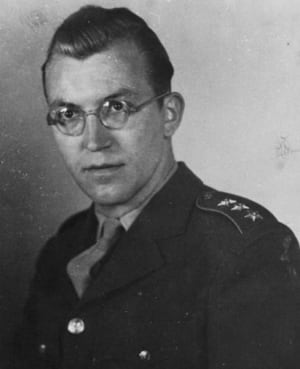4.12.1916 Jaromír Nechanský was born
Categories: Personalities , Second World War , Calendar
 Major Jaromír Nechanský was one of the most interesting personalities of the anti-Nazi and anti-communist resistance. He was a member of the Platinum-Pewter paratroop. After World War II, he was condemned and executed.
Major Jaromír Nechanský was one of the most interesting personalities of the anti-Nazi and anti-communist resistance. He was a member of the Platinum-Pewter paratroop. After World War II, he was condemned and executed.
Nechansky was born in Prague. His father was a clerk and his mother was a housewife. He went through a common school and then a real grammar school in Prague. He graduated in 1935 and in the spring of the same year he underwent voluntary conscription. He studied at the equestrian school in Pardubice and the Military Academy in Hranice na Moravě.
He is undoubtedly one of the most interesting tragic personalities of the anti-Nazi and anti-communist resistance in our country. A young officer brought up in the spirit of the First Republic, he did not accept its collapse and went abroad to fight against Nazi Germany.
He was a member of the Platinum-Pewter paratroop, which was a code name for a paratroop sent from England to the territory of the Protectorate of Bohemia and Moravia during the Second World War.
"He passed through France, joined our foreign army in Great Britain and was dropped into the homeland as a correspondent at the end of the war. He secretly infiltrated Prague, where he participated in the May Uprising," writes Jiří Šolc in his book The Sign of the Trojan Horse.
Immediately, Nechanský did not receive sufficient recognition for his extraordinary merits and began to cooperate for a short time with Czechoslovak intelligence, already controlled by the communists at that time. In the period after the war he also became the son-in-law of the Social Democratic Minister Laušman. After the events of February, however, his position was unambiguous. He began to cooperate with the Americans, but after a short time he was arrested, sentenced to death and executed.
The text Nechanský left before his execution has survived. "Dear Daddy! I take this opportunity to say goodbye to you all. I am writing this my last letter after midnight and I hope that I will still be allowed to see my dear Olga for the last time. The decision to allow her to visit has not yet been finally made...," Nechansky wrote in his letter.
He also reiterated that, as a socialist, he agreed in principle with most of the social measures, but had fundamental reservations about the authoritarianism, undemocracy and injustice of the regime at the time. "I can say of my actions that I acted as an officer in accordance with my clear and firm conviction, which resulted from the circumstances I stated in court," Nechansky wrote.
It was not until 1993 that Nechanský was judicially rehabilitated and returned to the rank of major. He was subsequently promoted in memoriam to the rank of colonel.
Sources.
You can search for artefacts from this period using our metal detectors.
The article is included in categories: